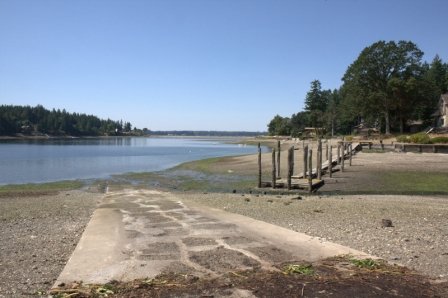[et_pb_text admin_label="PJ Kezele byline; remember to tag post as various-contributors" saved_tabs="all" background_layout="light" text_orientation="left" header_font="Arimo||||" text_font="||on||" use_border_color="off" border_color="#ffffff" border_style="solid"]
The Key Peninsula community has the Vaughn Bay residents, Puyallup Tribe of Indians, Tacoma-Pierce County Health Department and the Washington State Department of Health to thank for a large portion of Vaughn Bay reopening to commercial shellfishing after decades of closure. The state Department of Health recently gave about 104 acres on the west and north sides of Vaughn Bay the green light based on marine water sampling, pollution investigations and surface water sampling by Tacoma-Pierce County Health Department and Pierce County Public Works and Utilities.
 A view of Vaughn Bay, which has been reopened to commercialshellfishing. Photo by Karina Whitmarsh
A view of Vaughn Bay, which has been reopened to commercialshellfishing. Photo by Karina Whitmarsh
In a press release issued by the state Department of Health, Maryanne Guichard, director of the Shellfish and Water Protection office, said, “This has been a long time coming. It’s the result of hard work by Pierce County and local residents. I’m optimistic we can build on this success if we continue the good field work and have the community’s support on these issues.”
Bill Cleland, public health advisor with the Shellfish and Protection Office, said the Puyallup Tribe requested the evaluation of Vaughn Bay for commercial production of shellfish. “Previously, it was classified as prohibited, so we didn’t even monitor it,” he said. Based on the Puyallup Tribe’s request, the state Department of Health began taking water samples and conducting a sanitary survey.
According to Cleland, one key to the success of the effort to reopen the bay to shellfishing was the willingness of the residents surrounding the bay to have their septic systems tested with a more extensive dye. “In some areas, people won’t let the health department near their septic systems, much less let them put in a dye tablet,” Cleland said. “We had a very high percentage of folks who cooperated, thanks to public meetings that were held to inform the public what was up. It was those kinds of efforts that lead to improved water quality there.” Cleland also explained that failing septic systems that previously impacted the bay have been repaired or replaced over time, which is primarily what has helped clean up the bay.
Cleland stressed the importance of ongoing field work to ensure water quality. “In all of our shellfish growing areas, we continually monitor water quality,” he said. “Our crews are continuously trying to identify potential new sources not orignally recognized. We keep an eye on shorelines that might indicate future problems, such as forested hillsides being prepared for development.”
The eastern portion of Vaughn Bay will remain closed to shellfish harvesting until contamination sources can be identified and corrected. According to Cleland, that portion is impacted by a couple of creeks that come into the bay and have higher counts due to wildlife in the watershed.
UNDERWRITTEN BY THE FUND FOR NONPROFIT NEWS (NEWSMATCH) AT THE MIAMI FOUNDATION, THE ANGEL GUILD, ADVERTISERS, DONORS AND PEOPLE WHO SUPPORT INDEPENDENT, NONPROFIT LOCAL NEWS